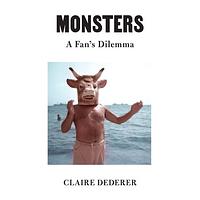Take a photo of a barcode or cover
reflective
slow-paced
This book really meanders in its subject matter, and I feel she conflates actions and “crimes” that are not even in the same ballpark (abandoning mothers vs violent sexual crimes against minors). She’s really just using the “what do we do with great art by bad people?” Question as jumping-off-point for all her thoughts about monsters and monstrosity in general. The real question at the heart of this book is “Isn’t everyone, on some level, monstrous? And if so, where do we draw the line of who gets forgiveness/redemption and who doesn’t? If we expect to be forgiven, shouldn’t we also be expected to forgive?” And she doesn’t have a clear answer for you -not that I really expected she would-
I loved some of this book and in other places it dragged and things felt out of place for what the book is claiming to be about. My favourite chapter was her analysis of Nabakov’s Lolita.
I loved some of this book and in other places it dragged and things felt out of place for what the book is claiming to be about. My favourite chapter was her analysis of Nabakov’s Lolita.
Monsters: What Do We Do With Great Art By Bad People? by Claire Dederer
My very first non-fiction read of 2025! I was drawn to this book by its cover, and I did the thing we are so often taught not to do, and I judged it. The pink made it stand out and the title, as well as the concept of this book, had me very intrigued. As always, this review contains spoilers so if you haven’t read it and aren’t looking for specifics about it then don’t read any further.
Monsters discusses an issue that has risen so crucially within the modern age of art, media, film, music, and the literary scene as well. The division between the art and the artist. How can us as fans still enjoy a piece of art if we find out the person who created it is immoral? Does that make us immoral for liking the art? Can we continue to enjoy it?
One argument that Dederer makes is using the situation with J.K. Rowling which I think is especially interesting as I am a fan of the Harry Potter books. I was raised in the wizarding world - the films, the books, the merch. So were many queer kids and trans kids as well. So Rowling doing what she did created such a struggle for LGBTQ+ Harry Potter fans because Harry Potter is such a comforting and wonderful thing on its own, but it now feels so tainted and disappointing when you remember who’s hand was on the pen. So can I continue to like Harry Potter? Even if I don’t spend any money towards the franchise, is it wrong of me to talk about how much I love the Prisoner of Azkaban knowing how harmful the views of the woman who wrote it are, and how her views contradict my own? Unfortunately, this book doesn’t give any answers to these kinds of questions. In fact, it kinds of just leads you on in an ongoing struggle that has no conclusion whatsoever.
A lot of this book also felt very memoir-like, which I wasn’t expecting and didn’t really enjoy. I picked up this book because of the topic it was said to discuss, not because I wanted to know about Claire Dederer and her friends’ opinions. For a non-fiction, I was expecting there to be more of a basis in the philosophical element behind it, perhaps in sociology or psychology. But there just wasn’t any. It just felt like one long twitter thread of people talking about the issue, who knew some things, but not a lot things. People who talk for the sake of talking.
I do think that the topic Dederer has presented is important and needs to be discussed, I just don’t think she was entirely successful in her aims when it came to this book. At least, it didn’t meet my expectations. So I recommend to people, especially readers, to do your research into this idea of the dichotomy between art and artist, and what you feel comfortable with when it comes to contributing towards art. At the end of the day it’s all about being mindful of your own views and who you are supporting.
My very first non-fiction read of 2025! I was drawn to this book by its cover, and I did the thing we are so often taught not to do, and I judged it. The pink made it stand out and the title, as well as the concept of this book, had me very intrigued. As always, this review contains spoilers so if you haven’t read it and aren’t looking for specifics about it then don’t read any further.
Monsters discusses an issue that has risen so crucially within the modern age of art, media, film, music, and the literary scene as well. The division between the art and the artist. How can us as fans still enjoy a piece of art if we find out the person who created it is immoral? Does that make us immoral for liking the art? Can we continue to enjoy it?
One argument that Dederer makes is using the situation with J.K. Rowling which I think is especially interesting as I am a fan of the Harry Potter books. I was raised in the wizarding world - the films, the books, the merch. So were many queer kids and trans kids as well. So Rowling doing what she did created such a struggle for LGBTQ+ Harry Potter fans because Harry Potter is such a comforting and wonderful thing on its own, but it now feels so tainted and disappointing when you remember who’s hand was on the pen. So can I continue to like Harry Potter? Even if I don’t spend any money towards the franchise, is it wrong of me to talk about how much I love the Prisoner of Azkaban knowing how harmful the views of the woman who wrote it are, and how her views contradict my own? Unfortunately, this book doesn’t give any answers to these kinds of questions. In fact, it kinds of just leads you on in an ongoing struggle that has no conclusion whatsoever.
A lot of this book also felt very memoir-like, which I wasn’t expecting and didn’t really enjoy. I picked up this book because of the topic it was said to discuss, not because I wanted to know about Claire Dederer and her friends’ opinions. For a non-fiction, I was expecting there to be more of a basis in the philosophical element behind it, perhaps in sociology or psychology. But there just wasn’t any. It just felt like one long twitter thread of people talking about the issue, who knew some things, but not a lot things. People who talk for the sake of talking.
I do think that the topic Dederer has presented is important and needs to be discussed, I just don’t think she was entirely successful in her aims when it came to this book. At least, it didn’t meet my expectations. So I recommend to people, especially readers, to do your research into this idea of the dichotomy between art and artist, and what you feel comfortable with when it comes to contributing towards art. At the end of the day it’s all about being mindful of your own views and who you are supporting.
dark
informative
informative
reflective
medium-paced
reflective
medium-paced
challenging
emotional
informative
reflective
fast-paced
informative
reflective
medium-paced
You know the whole "this meeting should've been an email" thing?
This book should've been a series of tiktoks. And I'm pretty sure I've seen tiktoks with deeper introspection into the subject matter.
Don't get me wrong, I wasn't expecting a definitive answer for this dilemma but it feels like I've gotten nothing new at all.
This book should've been a series of tiktoks. And I'm pretty sure I've seen tiktoks with deeper introspection into the subject matter.
Don't get me wrong, I wasn't expecting a definitive answer for this dilemma but it feels like I've gotten nothing new at all.
challenging
emotional
informative
reflective
this was just okay. i think this would be a really great read for someone who is just starting to navigate things like separating art VS artist and how to reconcile things like that. it didn't feel fit for me as a person who's been navigating it actively for a while. it was a fine read but i felt that certain things were exaggerated too much and other things were not exaggerated enough. i think this would've been a helpful read for me 5-7 years ago. still really interesting nonetheless!
Graphic: Addiction, Adult/minor relationship, Alcoholism, Child abuse, Pedophilia, Sexual assault, Sexual violence, Violence, Alcohol
challenging
hopeful
inspiring
reflective
slow-paced






